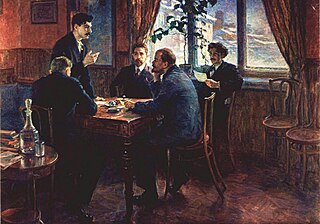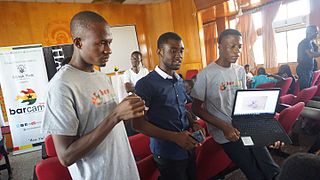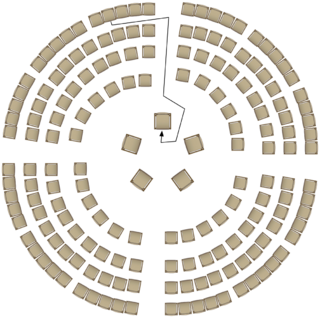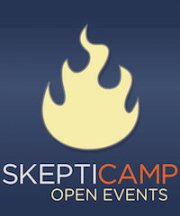O'Reilly Media, Inc. is an American learning company established by Tim O'Reilly that provides technical and professional skills development courses via an online learning platform. O'Reilly also publishes books about programming and other technical content. Its distinctive brand features a woodcut of an animal on many of its book covers. The company was known as a popular tech conference organizer for more than 20 years before closing the live conferences arm of its business.
A meeting is when two or more people come together to discuss one or more topics, often in a formal or business setting, but meetings also occur in a variety of other environments. Meetings can be used as form of group decision-making.
In politics, emergent democracy represents the rise of political structures and behaviors without central planning and by the action of many individual participants, especially when mediated by the Internet. It has been likened to the democratic system of ancient Greece in the sense that people could publicly participate as much or as little as they please, although a form of representation exists which is based on personal trust networks instead of party affiliations. More recently, American writer and researcher Clay Shirky has referred to this as "the power of organizing without organizations."

A conference is a meeting, often lasting a few days, which is organized on a particular subject, or to bring together people who have a common interest. Conferences can be used as a form of group decision-making, although discussion, not always decisions, is the primary purpose of conferences. The term derives from the word confer.
The International Congress on Medieval Studies is an annual academic conference held for scholars specializing in, or with an interest in, medieval studies. It is sponsored by the Medieval Institute at the Western Michigan University in Kalamazoo, Michigan, and is held during the first half of May. The Congress is the largest annual gathering in the field, regularly attracting over three thousand registered participants from all over the world. The 50th annual conference took place in 2015.
BloggerCon was a user-focused conference for the blogger community that ran between 2003 and 2006. BloggerCon I and II, were organized by Dave Winer and friends at Harvard Law School's Berkman Center for the Internet and Society in Cambridge, Massachusetts BloggerCon III took place in San Francisco in June 2006. According to the Online Journalism Review, "BloggerCon has lots of cooks, but the chief chef is technologist Dave Winer, co-founder of RSS and the patient zero of blogging. BloggerCon exists because Winer wants it to happen."

Foo Camp is an annual hacker event hosted by publisher O'Reilly Media. O'Reilly describes it as "the wiki of conferences", where the program is developed by the attendees at the event, using big whiteboard schedule templates that can be rewritten or overwritten by attendees to optimize the schedule; this type of event is sometimes called an unconference.

BarCamp is an international network of user-generated conferences primarily focused on technology and the web. They are open, participatory workshop-events, the content of which is provided by participants. The first BarCamps focused on early stage web applications, and were related to open-source technologies, social software, and open data formats.
Renaissance Weekend is the name for a recurring series of invitation-only gatherings founded and hosted by Linda and Philip Lader. The concept was founded in 1981 with the objective of bridging traditional divides of professions, politics, religion, race and age. It substantially increased in prominence when repeat-participant Bill Clinton was elected president in 1992. A few other notable past participants include Hillary Clinton, Supreme Court Justices Harry Blackmun, Ruth Bader Ginsburg and Stephen Breyer, Donald Rumsfeld, Daniel Schorr, Wolf Blitzer Buzz Aldrin, and Mary Chapin Carpenter among many others.
Open space technology (OST) is a method for organizing and running a meeting or multi-day conference where participants are invited to focus on a specific, important task or purpose. The agenda and schedule of presentations are partly or mostly unknown until people begin arriving. The scheduling of speakers, topics, and locations is created by people attending once they arrive. A debriefing document is created at the end of each OST meeting, summarizing what worked and what did not. Harrison Owen created the method in the early 1980s as an alternative to pre-planned conferences, where conference organizers predetermined speakers and time was often scheduled months in advance. OST instead relies on decisions made by participants once they are physically present at the live event venue. OST was among the top ten organizational development tools cited between 2004 and 2013.

Science Foo Camp (scifoo) is an annual interdisciplinary scientific unconference organized by O'Reilly Media, Digital Science, Alphabet Inc., based on an idea from Linda Stone. The event is based on the spirit and format of Foo Camp, an event focused on emerging technology, and is designed to encourage collaboration between scientists who would not typically work together. As such, it is unusual among conferences in three ways:
- attendance is by invitation-only
- the delegates come from many different areas of science rather than one subject, such as physics, chemistry or biology
- the meeting has no fixed agenda; the invited scientists, technologists and policy makers set the conference program during the conference itself, based on their shared professional interests and enthusiasms, aka unconference

A fishbowl conversation is a form of dialogue that can be used when discussing topics within large groups. Fishbowl conversations are sometimes also used in participatory events such as unconferences. The advantage of fishbowl is that it allows the entire group to participate in a conversation. Several people can join the discussion.

Kinnernet is a series of invitation-only unconference events formed by entrepreneurs, technologists, startup founders, scientists, media professionals, and creatives.
A TeachMeet is an informal meeting, organised by teacher for teachers to share good practice, practical innovations and personal insights on teaching in a convivial atmosphere. TeachMeet events are open to all, do not charge an entry fee, and take place in a social setting. These events are often organised to coincide with other educational events like the Scottish Learning Festival and the British Educational Technology and Training Show BETT.
Stream is a series of digital unconferences hosted by WPP. It is run by volunteers and sponsored by some of WPP's agency clients. Stream Europe takes place in Greece in October each year and hosts over three hundred people in the creative, media and technology industries. Attendees discuss and debate ideas and opportunities in the areas of culture, innovation and the internet.
SpaceUp is an open-attendance space exploration unconference, where participants decide the topics, schedule, and structure of the event. SpaceUps have been held on both West and East coasts, and in Houston. Common features of SpaceUps are an unconference/barcamp style schedule, Ignite talks, and a moonpie eating contest.
The Ada Initiative was a non-profit organization that sought to increase women's participation in the free culture movement, open-source technology and open culture. The organization was founded in 2011 by Linux kernel developer and open source advocate Valerie Aurora and open source developer and advocate Mary Gardiner. It was named after Ada Lovelace, who is often celebrated as the world's first computer programmer, as is the Ada programming language. In August 2015, the Ada Initiative board announced that the organization would shut down in October 2015. According to the announcement, the Initiative's executive leadership decided to step down, and the organization was unable to find acceptable replacement leaders.

SkeptiCamp was founded by Reed Esau in 2007 and is small grassroots conference where scientific skeptics come together and participate and present. Skepticamps are held in varying formats worldwide and are operated in the style of an unconference.

AdaCamp was a series of unconferences organized by the Ada Initiative. AdaCamp was the only conference that focused on women's participation in open technology and culture, including the development of free and open source software and contributions to projects like Wikipedia. AdaCamps were among the projects and resources the Ada Initiative provided to make workplaces more friendly for women.
The London Process is a series of multistakeholder meetings held biennially since 2011 under the name Global Conference on Cyberspace or GCCS. In each GCCS meeting, governments, the private sector and civil society gather to discuss and promote practical cooperation in cyberspace, to enhance cyber capacity building, and to discuss norms for responsible behavior in cyberspace. The London Process was proposed by British Foreign Secretary William Hague at the 2011 Munich Security Conference.








